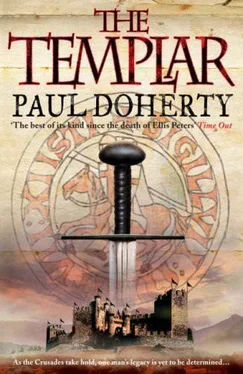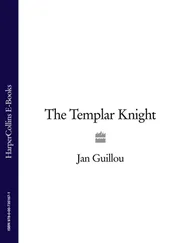P. Doherty - The Templar
Здесь есть возможность читать онлайн «P. Doherty - The Templar» весь текст электронной книги совершенно бесплатно (целиком полную версию без сокращений). В некоторых случаях можно слушать аудио, скачать через торрент в формате fb2 и присутствует краткое содержание. Год выпуска: 2010, ISBN: 2010, Издательство: Minotaur Books, Жанр: Исторические приключения, на английском языке. Описание произведения, (предисловие) а так же отзывы посетителей доступны на портале библиотеки ЛибКат.
- Название:The Templar
- Автор:
- Издательство:Minotaur Books
- Жанр:
- Год:2010
- ISBN:9780312576837
- Рейтинг книги:5 / 5. Голосов: 1
-
Избранное:Добавить в избранное
- Отзывы:
-
Ваша оценка:
- 100
- 1
- 2
- 3
- 4
- 5
The Templar: краткое содержание, описание и аннотация
Предлагаем к чтению аннотацию, описание, краткое содержание или предисловие (зависит от того, что написал сам автор книги «The Templar»). Если вы не нашли необходимую информацию о книге — напишите в комментариях, мы постараемся отыскать её.
The Templar — читать онлайн бесплатно полную книгу (весь текст) целиком
Ниже представлен текст книги, разбитый по страницам. Система сохранения места последней прочитанной страницы, позволяет с удобством читать онлайн бесплатно книгу «The Templar», без необходимости каждый раз заново искать на чём Вы остановились. Поставьте закладку, и сможете в любой момент перейти на страницу, на которой закончили чтение.
Интервал:
Закладка:
Summer was ending in a golden glow, continued Beltran like a true troubadour; the harvest was ripening, fatbellied cattle and sheep grazed in the meadows. The People’s Army, bereft of Peter, who had stayed in Constantinople, began to have itchy feet and even itchier fingers. Foraging turned into plundering and reaping into rapine as they explored the paths through fertile valleys and well-stocked meadows. Although they did not know it — Beltran held a hand up — they were being closely watched by Seljuk scouts, who soon noticed how disorganised and ill-led the People’s Army had become. The Seljuks waited. The cross-bearers, hungry for plunder, planned a harrying chevauchée , a raid up to the walls of Nicea. They elected a mercenary, Rainald of Bruges, as their leader, and debouched on to the plains, unaware that they were being shadowed by the Seljuks on their nimble ponies, fierce warriors with their long plaited hair, necklaces and earrings; across their chests were lacquered armour plates, whilst from their saddle horns hung quivers and sturdy horn bows. These watched the cross-bearers and bided their time. Rainald led them to Xerigardon, a deserted fortress. Once they had fortified this, the rabble ruthlessly pillaged the surrounding countryside, unaware of how the Seljuks had now circled them.
In a flurry of fierce sorties, the Seljuks forced the People’s Army back into the fort, then cut off their water supply, a well close by the gate and a nearby fountain. According to Beltran, the People’s Army suffered hideous losses. They were now besieged, hunted, harassed and wounded, bereft of water and support and exposed to the late autumn heat. They grew so tormented by thirst they even drew blood from the veins of their horses and donkeys to drink. Some urinated into the hands of others, then supped it. Many dug into the moist ground and lay down, spreading the earth over them to allay the terrible heat. For eight days this agony continued. At last Rainald entered into a treasonable correspondence with the Turks and, in return for his life, agreed to hand over the others. The Turks placed some of their prisoners in a long line and used them for arrow practice; those they favoured were taken back to be sold in the slave markets.
Beltran now had his listeners spellbound. Meanwhile, he continued, back at Civetot, Walter Sans-Avoir and the other captains had heard about this disaster and hastened to help. The mob thronged along the road towards the deserted fortress without any order, although Walter and a handful of knights managed to keep a force of five hundred horsemen together. The Turks watched in astonishment, then trapped the entire army in a valley. Walter was killed in the first foray, seven arrows piercing his body. The Turks had won a great victory. The remnants of the People’s Army fled back along the road. The Turks followed in pursuit and captured their camp, cutting down the Christian sick and enslaving the women. News of the disaster reached Constantinople, but all the Emperor could do was send troops to help those who had fled and hidden in rocky gulleys or caves…
The Poor Brethren received all this news with loud groans, cries and lamentations. Eleanor, warming her hands near a fire, heard similar sounds from other parts of the camp and realised that heralds were spreading the dismal news elsewhere. Beltran had not yet finished; his litany of woes continued. Other crusading armies had emerged under the likes of Gottschalk, a German priest so cruel and predatory that the Hungarian king had ordered the total destruction of both him and his army…
Eleanor listened carefully. She had read vague rumours about such hideous events in the letters, memoranda and other missives dispatched to the chancery of Raymond of Toulouse. She and Hugh had been well educated by their widowed mother, a sharp martinet of a woman who’d mourned her husband at every waking moment; she had constantly reminded Eleanor and Hugh how God had taken her saintly man in the flower of his youth. She was also determined that both her children should rigorously study their horn books. They graduated on to Latin grammar and syntax, not to mention courtly French and even a few words of Greek. A harsh discipline! Eleanor often reflected on her bruised knuckles. She could still chant the Greek alphabet, as well as the more complex Latin tenses. Such a rigorous education had only drawn her and Hugh closer together, so that they had become like two peas in a pod. Even a drunken husband, the birth of a child who had died shortly afterwards, the upsetting of their world and the preaching of Urban could not shake that.
Once Beltran had finished, Eleanor accosted Hugh, demanding to know whether such terrible news could be true.
‘There is worse,’ he confessed, and took her to Raymond’s chancery tent, where Eleanor, as she later wrote in her chronicle, quickly realised that God was not always with the cross-bearers. Raymond of Toulouse’s clerks had also received dreadful news about Emicho, Count of Leiningen, who had used the call to Jerusalem to unleash a blizzard of hatred against the Rhineland Jews. Emicho truly believed he would be rewarded for his work with a diadem in Constantinople. He first tried his mischief at Speyer but then turned on Mainz and the Jews who hid in the shadows of that great city, locked in their own world, garbed in their grey and purple robes, treasuring their traditions, studying the Torah and celebrating their calendar of feasts. Once at Mainz, Emicho, who believed a red cross had miraculously appeared on his flesh — probably a flea bite — together with William the Carpenter, Vicomte of Melun, viciously attacked the Jews there. The vicomte, a killer to the bone, had acquired his sinister nickname in Iberia because of his passion for hammering spikes and nails into the foreheads of his victims. These two assassins and their cohorts took the trampled corpse of one of their company, buried thirty days previously, and carried it through the city saying, ‘Behold what the Jews have done to our comrade. They have taken a gentile and boiled him in water. They then poured the water into your wells to kill you.’ Violence erupted. Many Jews fled for safety to the bishop’s palace but were later betrayed. Emicho and William seized a leading Jew named Isaac. They put a rope around his neck and dragged him through the muddy streets to the place of execution, where they screamed at him to convert and be saved. Isaac signalled with his finger that he was unable to utter a word for his neck was choked off, yet when they released the rope, he said simply, ‘Cut off my head.’ They did so, then encouraged their followers to go on a bloody rampage. They killed about seven hundred Jews, who could not resist the attack of so many thousands. Various letters repeated the same horrors, a litany of hideous acts. Eventually Eleanor could read no more. She handed the documents back to the scribe and, followed by Hugh and Godefroi, left the chancery tent.
Later, Eleanor, Hugh, Godefroi, Alberic and Imogene gathered in a sombre mood for the evening meal of grilled rabbit meat and rastons. They met in the large shabby pavilion shared by Godefroi and Hugh; it reeked of scorched ox-hide, leather, sweat and charcoal. Father Alberic sang grace as Beltran pushed his way in and joined the circle just inside the pavilion’s entrance. Behind him echoed the noises of the camp settling for the night. They all paused at the sound of a wolf howling mournfully at the full moon.
‘A harsh day.’ Godefroi bit into the half-baked bread, made a face and thrust the wine goblet to his mouth.
‘Terrible news,’ Alberic murmured. ‘So many cross-bearers massacred. Peter the Hermit disgraced.’
‘A rabble,’ Hugh countered. ‘They and others murdered Jews, massacring women and children! What has that to do with God’s work?’
Читать дальшеИнтервал:
Закладка:
Похожие книги на «The Templar»
Представляем Вашему вниманию похожие книги на «The Templar» списком для выбора. Мы отобрали схожую по названию и смыслу литературу в надежде предоставить читателям больше вариантов отыскать новые, интересные, ещё непрочитанные произведения.
Обсуждение, отзывы о книге «The Templar» и просто собственные мнения читателей. Оставьте ваши комментарии, напишите, что Вы думаете о произведении, его смысле или главных героях. Укажите что конкретно понравилось, а что нет, и почему Вы так считаете.












